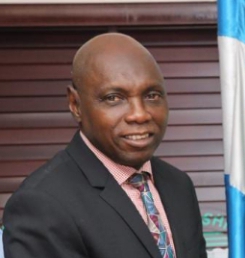
The Port Standing Task Team (PSTT) says it is adopting an “invisible” strategy, staying vigilant against potential security threats. This is even as stakeholders in the maritime industry are calling for increased resources and an expanded mandate to address both outbound and inbound port access road challenges effectively.
The Port Standing Task Team was created with the Nigerian Shippers’ Council (NSC) as the lead agency in collaboration with the Independent Corrupt Practices and Other Related Offences Commission (ICPC), Department of State Services (DSS) and Nigerian Port Authority (NPA).
It was saddled with the responsibility of monitoring and enforcement of the Nigeria Port Process Manual (NPPM) as well as fostering efficiency and transparency in port operations.
Shipping Position Daily recalls that there have been misconceptions about the activities of the operations of the PSTT headed by Mr Moses Fadipe at the ports. Despite past successes of the team, there are claims that corrupt practices at the port have been on the increase as well as the return of gridlock to port access roads.
However, in a recent chat with one of our correspondents, the Executive Secretary of NSC, Barr. Pius Akutah Ukeyima revealed plans to overhaul, revamp and rejuvenate the PSTT to combat the persistent challenges of port access road congestion and corruption at the ports.
But, speaking with the National Coordinator of the PSTT, Mr Moses Fadipe last week, he assured that despite existing challenges, the team is operational, and measures are in place to address issues effectively.
Speaking about the current situation, Fadipe emphasized the Shippers Council’s continued presence as the lead agency, collaborating closely with other government agencies. He assured that operational activities persist both online and physically, with a swift response to issues as they arise.
“The current state is that PSST still operates and it’s still running currently. The Shippers Council is the lead agency for that committee. The new CEO of the Council is assiduously studying our reports to know the best way to make things better than the way we have been before. That is the situation now. We are very much on the ground. All the agencies such as the DSS and others are very much on ground.
“We still have our operation in the port. As I speak to you now, we still attended to some issues at the port today. They contact us when there are issues. We operate online and physically. When there is need for a physical intervention we deploy people there”.
“Part of our strategies is that you might not see us physically but when an issue arise, you will see them in their numbers and you will be wondering where did they come out from. It is not all the time you keep your men in one place. We have experienced a lot of attacks in the past and that is because they know our location and where to attack”, he added.
A truck owner and Vice President of Nexus Association of Maritime Transport Operators (NAMTOP), Mr Rilwan Bello commended the PSTT for its positive impact on curbing corrupt practices around the port. He however pointed out that the task force’s success appeared more pronounced on out-bound routes, leaving lingering challenges on the in-bound access roads for truck drivers and owners.
Bello emphasized the need for increased funding and the effective leadership of Mr. Moses Fadipe, advocating that a well-supported PSTT could eliminate road banditry along inbound routes as well as ultimately facilitating smoother business operations.
“To be honest, PSTT is the best thing that happened around the port as regards curbing the corrupt practices within the port jurisdiction. Unfortunately, I feel PSTT impact was felt more on the outbound and not the inbound route to the port as regards the road menace affecting truck drivers and truck owners. I think PSTT recorded more success story in the port”, he stated.
Also speaking, the Secretary General of Lagos State Truck and Cargo Operators Committee (LASTCOC), Bala Muhammed praised the PSTT as a “game-changer” adding that it has significantly enhanced port operations, efficiency, and the smooth evacuation of cargo.
Muhammed highlighted the dismantling of extortion checkpoints on outbound routes, increased transparency in cargo examination, and a reduction in corruption and infractions as successes recorded by the PSTT. He however, called on the Federal Government to provide financial and human resource support for the sustainable operations of the PSTT.
Additionally, Muhammed urged a review of PSTT’s mandate to include handling the inbound section of port access roads, where according to him extortion activities are reportedly rampant.
“The Ports Standing Task Team is a game-changer in the area of enhancing ports operations, efficiency and free flow of cargo evacuation. The PSTT has assisted a lot in dismantling extortion checkpoints on the outbound section of the port access road to enhance seamless evacuation of cargo from the ports and trade facilitation”, he added.
But, contrary to the positive assessments, the Tin Can Chapter Public Relations Officer of the African Association of Professional Freight Forwarders of Nigeria (APFFLON), Mr Clinton Okoro raised serious concerns about the perceived inactivity of the PSTT.
Okoro alleged collusion between the Shippers Council, shipping companies, and terminal operators lamenting that opinions and input from relevant stakeholders are not sought before the introduction and implementation of new policies in the ports.
However, Okoro called for improved communication with stakeholders and increased transparency in the PSTT’s operations. According to him, these can address port concerns and build trust in the minds of stakeholders.
“The PSTT is no longer active. In fact, I see connivance between the Shippers Council, Shipping companies and terminal operators. You will just come to work and see one letter posted everywhere saying the Shippers Council has approved without informing or letting the people that are in the field know what is going on”, he alleged.















